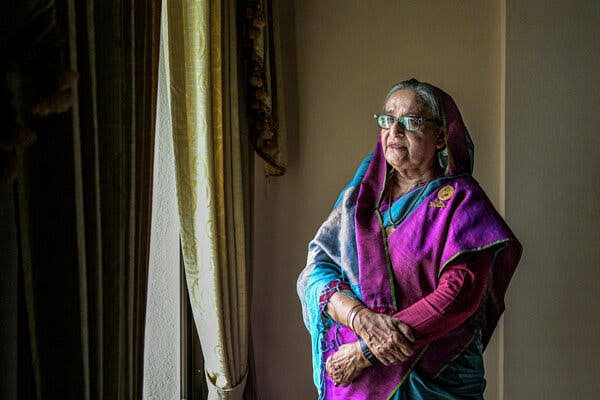Staff Correspondent
Published:2025-07-11 07:46:55 BdST
July atrocitiesHasina’s trial gathers pace, verdict likely next month
The trial of ousted Prime Minister Sheikh Hasina for crimes against humanity during the 2024 mass uprising is proceeding at a rapid pace, with a verdict anticipated by the end of next month.
This accelerated pace is largely attributed to the announcement by former Inspector General of Police (IGP) Chowdhury Abdullah Al-Mamun, a co-accused now in jail, that he will become an approver (state witness), and the emergence of a leaked audio recording of Hasina allegedly authorising the use of lethal force against protesters.
The International Crimes Tribunal-1 (ICT-1) on Thursday formally framed charges against three accused in the case filed over the crimes against humanity committed during the July uprising: Sheikh Hasina, former Home Minister Asaduzzaman Khan Kamal (who is a fugitive like Hasina), and Abdullah Al-Mamun.
Charge-framing is a critical step that clearly defines the prosecution's case against the accused. The core issues of the case are now being addressed, and the trial will proceed at a faster speed.
The progress indicates that the verdict in the case filed with the ICT is expected by the end of next month, the first anniversary of the downfall of the Hasina-led autocratic Awami League regime.
Legal analysts and ICT insiders said Hasina's trial will not be delayed as it is now at the stage where the witness testimonies will be taken in a short time, and the prosecution has sufficient evidence over the 2024 atrocities.
After framing charges, the ICT-1 fixed 3 August for the opening statement and 4 August for the first recording of the deposition in the case. The tribunal is expected to end the recording of depositions in August.
A lawyer said since it seems that the defence will not argue and cross-examine the witnesses, the tribunal can, if it wishes, resolve the core issues of the case just in days after 4 August and deliver a verdict by the end of August.
"We want at least one verdict in the month of downfall of the Hasina regime," said Muzahedul Islam Shahin, former executive member at the July Shaheed Smrity Foundation.
ICT Prosecutor Barrister SM Moynul Karim said, "Since it is a sub-judiced matter, we cannot say when the trial will end and when the verdict will be delivered, but we can say that Sheikh Hasina's trial is now visible."
Law Adviser Dr Asif Nazrul at a programme on Monday said the trial of the killers of the 2024 mass uprising must be held before the upcoming general election, which could be held in February 2026. "The judicial process is going on in full swing, and it is now fully visible," he said.
According to sources, the ICT prosecution team has been working with the goal so that the tribunal can deliver at least one verdict over the 2024 atrocities in the month of the anniversary of the July uprising.
Alongside the crimes against humanity case filed against Hasina, the verdict in the Chankharpool massacre case, which was filed over the killings of six students in the city's Chankharpool area on 5 August 2024, is expected within the days after the verdict of the Hasina case.
The prosecution on 25 May submitted a charge sheet in the Chankharpool massacre case. It was the maiden formal charge filed with the ICT in the cases over the 2024 mass killings, as the charge sheet was submitted a week before submission of the charge sheet in the Hasina case.
The ICT-1 is scheduled to pass an order on charge-framing in the Chankharpool massacre case on 14 July.
Hasina's trial proceeding is progressing at a faster pace than other cases due to the audio call of Hasina where she approved the use of lethal weapons on students during the student-led mass movement, and the announcement of Chowdhury Abdullah Al-Mamun as becoming state witness.
Hasina's leaked phone conversation is being considered key evidence in the case, speeding up the trial process.
Following the ICT order, the Criminal Investigation Department (CID) of police confirmed the 18 July recording matched known audio samples of Hasina's voice.
The BBC conducted its own independent verification on the call record with audio forensics experts of UK-based audio forensics firm Earshot, who found no evidence the speech had been edited or manipulated and said it was highly unlikely to have been synthetically generated.
ICT Chief Prosecutor Advocate Muhammad Tajul Islam said although the BBC also verified Hasina's audio call for its purposes, it was uncovered by the special investigation officer of the ICT. "It is just a trailer. Much more is yet to come," he said.
Former IGP Al Mamun's confession of crimes against humanity during the July uprising and announcement of becoming a prosecution witness also sped up the trial process.
As per the ICT law, if convicted, Hasina and Kamal could face death penalty, while the tribunal may issue a different decision for Mamun. As the ousted PM fled to India, the trial is happening in absentia, but she and Kamal have state-appointed defence counsel to represent them.
According to a UN report, over 1,400 people were killed between 15 July and 5 August last year as Hasina's government ordered a security crackdown on protesters.
Many Awami League leaders and ministers and several officials of the past regime were arrested or were on the run at home and abroad as Prof Muhammad Yunus-led interim government initiated their trial for brutal actions to tame the 2024 mass uprising, which led to the toppling of the nearly 16-year Awami League regime on 5 August and forced Hasina to flee the country.
On 3 June, the ICT-1 sentenced Hasina to six months in prison over contempt of court charges. It marks the first time that the 77-year-old Awami League leader has been sentenced in any case since she fled the country.
Unauthorized use or reproduction of The Finance Today content for commercial purposes is strictly prohibited.


